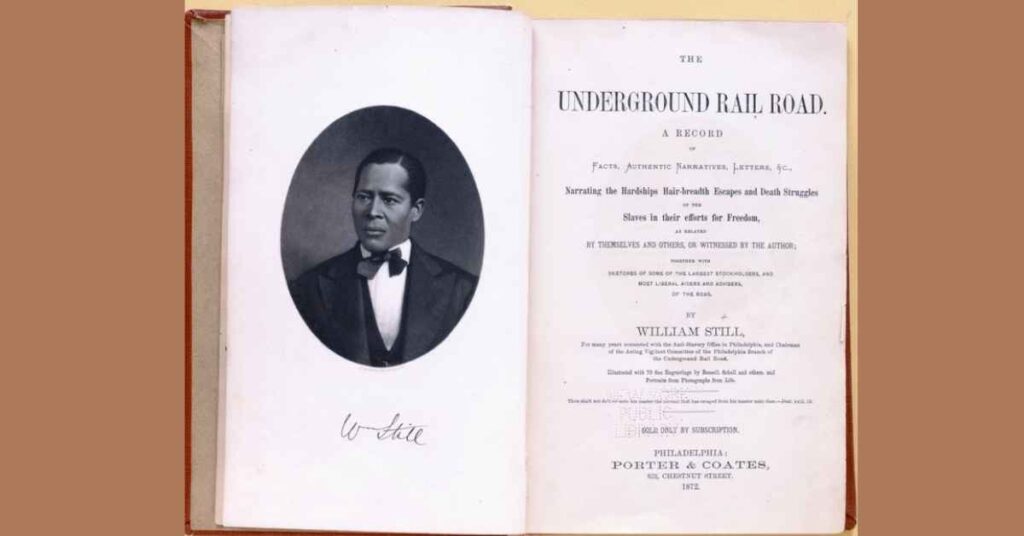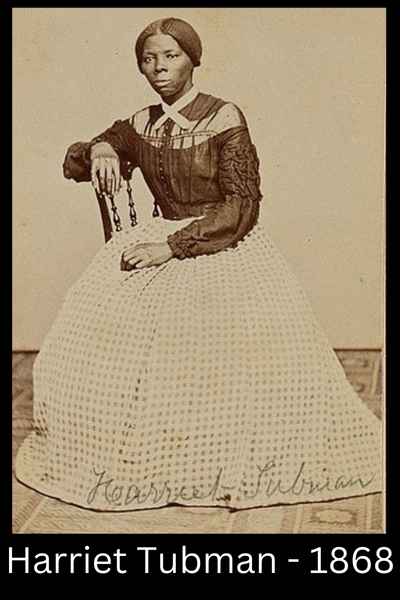This excerpt from “The Underground Railroad” by William Still documents seven fugitive slaves who were escorted from Maryland by Harriet Tubman.
It’s easy to think of Tubman as a legendary character. But did you know that her maiden name was Araminta Ross? This heroine was flesh-and-blood.
The excerpt starts with a letter from the abolitionist Quaker, Thomas Garrett. He mentions that Harriet Tubman had destroyed her shoes from the long walk to freedom.
About The Book
“The Underground Railroad” was published in 1872. The book gives the testimonies of hundreds of slaves who escaped to freedom using the network of agents and safe houses.
The author, William Still, was a black abolitionist and businessman who was a key member of the Philadelphia stop in the freedom network.
The book is in the public domain. It can be found in the Library of Congress.
Any headings and italicized text in the excerpt below were added by the website editor. The rest is nearly verbatim from the book. There are some changes to the punctuation.

Excerpt – Letter From Thomas Garret
Thomas Garrett was an abolitionist Quaker who helped thousands of fugitives as a conductor on the Underground Railroad.
He writes to the underground committee in Philadelphia to tell them that Harriet Tubman was bringing seven fugitives to Philadelphia to be sent on to freedom in Canada.
The coming of these passengers was heralded by Thomas Garrett as follows:
WILMINGTON, 12 mo. 29th, 1854.
ESTEEMED FRIEND, J. MILLER MCKIM:
We made arrangements last night, and sent away Harriet Tubman, with six men and one woman to Allen Agnew’s, to be forwarded across the country to the city.
Harriet, and one of the men had worn their shoes off their feet, and I gave them two dollars to help fit them out, and directed a carriage to be hired at my expense, to take them out, but do not yet know the expense.
I now have two more from the lowest county in Maryland, on the Peninsula, upwards of one hundred miles.
I will try to get one of our trusty colored men to take them to-morrow morning to the Anti-slavery office. You can then pass them on.
THOMAS GARRETT.
William Still’s Account Of Harriet Tubman
Harriet Tubman had been their “Moses,” but not in the sense that Andrew Johnson was the “Moses of the colored people.”
She had faithfully gone down into Egypt, and had delivered these six bondmen by her own heroism.
Harriet was a woman of no pretensions, indeed, a more ordinary specimen of humanity could hardly be found among the most unfortunate-looking farm hands of the South.
Yet, in point of courage, shrewdness and disinterested exertions to rescue her fellow men, by making personal visits to Maryland among the slaves, she was without her equal.
Her success was wonderful.
Time and again she made successful visits to Maryland on the Underground Rail Road, and would be absent for weeks, at a time, running daily risks while making preparations for herself and passengers.
Great fears were entertained for her safety, but she seemed wholly devoid of personal fear.
The idea of being captured by slave-hunters or slaveholders, seemed never to enter her mind. She was apparently proof against all adversaries.
While she thus manifested such utter personal indifference, she was much more watchful with regard to those she was piloting.
Half of her time, she had the appearance of one asleep, and would actually sit down by the road-side and go fast asleep when on her errands of mercy through the South.
[This picture is about fourteen years after the events in this excerpt:]

Harriet’s Leadership On The Road
Yet, she would not suffer one of her party to whimper once, about “giving out and going back,” however wearied they might be from hard travel day and night.
She had a very short and pointed rule or law of her own, which implied death to any who talked of giving out and going back.
Thus, in an emergency she would give all to understand that “times were very critical and therefore no foolishness would be indulged in on the road.”
That several who were rather weak-kneed and faint-hearted were greatly invigorated by Harriet’s blunt and positive manner and threat of extreme measures, there could be no doubt.
After having once enlisted, “they had to go through or die.”
Of course Harriet was supreme, and her followers generally had full faith in her, and would back up any word she might utter. So when she said to them that “a live runaway could do great harm by going back, but that a dead one could tell no secrets,” she was sure to have obedience.
Therefore, none had to die as traitors on the “middle passage.”
It is obvious enough, however, that her success in going into Maryland as she did, was attributable to her adventurous spirit and utter disregard of consequences.
Her like it is probable was never known before or since.
On examining the six passengers who came by this arrival they were thus recorded:
John Chase alias Daniel Floyd
December 29th, 1854—John is twenty years of age, chestnut color, of spare build and smart.
He fled from a farmer, by the name of John Campbell Henry, who resided at Cambridge, Dorchester Co., Maryland.
On being interrogated relative to the character of his master, John gave no very amiable account of him. He testified that he was a “hard man” and that he “owned about one hundred and forty slaves and sometimes he would sell,” etc.
John was one of the slaves who were “hired out.” He “desired to have the privilege of hunting his own master.” His desire was not granted.
Instead of meekly submitting, John felt wronged, and made this his reason for running away. This looked pretty spirited on the part of one so young as John.
The Committee’s respect for him was not a little increased, when they heard him express himself.
Benjamin Ross alias James Stewart
Benjamin was twenty-eight years of age, chestnut color, medium size, and shrewd.
He was the so-called property of Eliza Ann Brodins, who lived near Buckstown, in Maryland. Ben did not hesitate to say, in unqualified terms, that his mistress was “very devilish.”
He considered his charges, proved by the fact that three slaves (himself one of them) were required to work hard and fare meagerly, to support his mistress’ family in idleness and luxury.
The Committee paid due attention to his ex parte statement, and was obliged to conclude that his argument, clothed in common and homely language, was forcible, if not eloquent, and that he was well worthy of aid.
Benjamin left his parents besides one sister, Mary Ann Williamson, who wanted to come away on the Underground Rail Road.
Henry Ross alias Levin Stewart
Henry left his wife, Harriet Ann, to be known in future by the name of “Sophia Brown.”
He was a fellow servant of Ben’s, and one of the supports of Eliza A. Brodins.
Henry was only twenty-two, but had quite an insight into matters and things going on among slaves and slave-holders generally, in country life.
He was the father of two small children, whom he had to leave behind.
Peter Jackson alias Staunch Tilghman
Peter was owned by George Wenthrop, a farmer, living near Cambridge, Md.
In answer to the question, how he had been used, he said “hard.” Not a pleasant thought did he entertain respecting his master, save that he was no longer to demand the sweat of Peter’s brow.
Peter left parents, who were free; he was born before they were emancipated, consequently, he was retained in bondage.
Jane Kane alias Catherine Kane
Jane, aged twenty-two, instead of regretting that she had unadvisedly left a kind mistress and indulgent master, who had afforded her necessary comforts, affirmed that her master, “Rash Jones, was the worst man in the country.”
The Committee were at first disposed to doubt her sweeping statement, but when they heard particularly how she had been treated, they thought Catharine had good ground for all that she said.
Personal abuse and hard usage were the common lot of poor slave girls.
Robert Ross
Robert was thirty-five years of age, of a chestnut color, and well made.
His report was similar to that of many others.
He had been provided with plenty of hard drudgery—hewing of wood and drawing of water, and had hardly been treated as well as a gentleman would treat a dumb brute.
His feelings, therefore, on leaving his old master and home, were those of an individual who had been unjustly in prison for a dozen years and had at last regained his liberty.
The civilization, religion, and customs under which Robert and his companions had been raised, were, he thought, “very wicked.”
Although these travelers were all of the field-hand order, they were, nevertheless, very promising, and they anticipated better days in Canada.
Good advice was proffered them on the subject of temperance, industry, education, etc. Clothing, food and money were also given them to meet their wants, and they were sent on their way rejoicing.